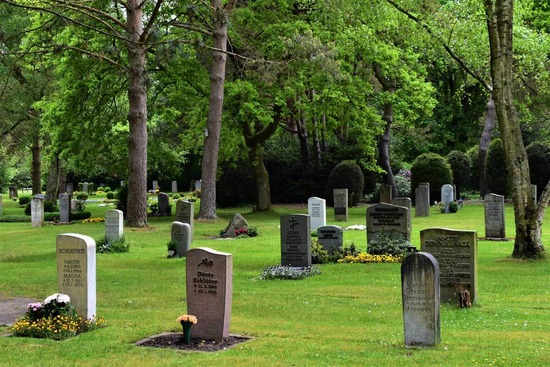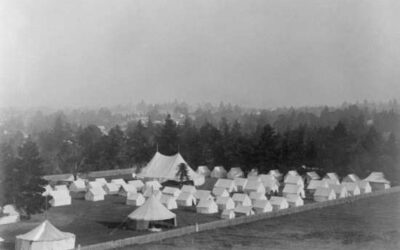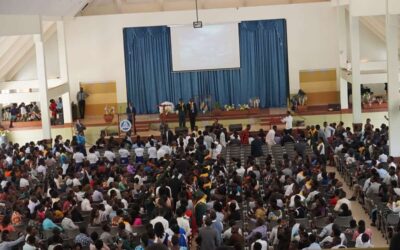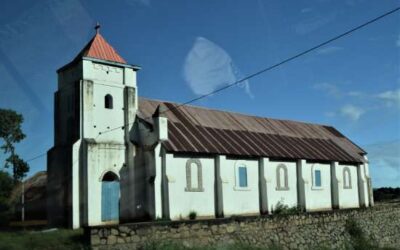Most Seventh-day Adventist funeral services are similar to those of other Protestant denominations, such as Methodists, Baptists, or Presbyterians, but you might find a few differences or unique nuances.
Adventists consider death a sad effect of sin. It is a time for mourning and recognizing the fragility of life, and it should be regarded with the appropriate amount of somber respect for those it affects.
It is always difficult to face death, whether thinking about our own or that of someone we care about.
Adventists also look forward in faith to the resurrection at the Second Coming of Christ. Though we recognize that death is a sad occasion, there is a measure of comfort and peace we can hold onto as believers, knowing we will be reunited at Jesus’ return.
Let’s look more closely at these beliefs, and how members of the Seventh-day Adventist Church put them into practice:
- What Adventists believe about death
- Common Adventist burial practices
- Common funeral practices
- How Adventists support the bereaved
Let’s start by looking at the scriptural basis for how we view death.
What Adventists believe about death

Photo by Sandy Millar on Unsplash
You can read the official Fundamental Belief page about this topic, but here’s a summary.
Seventh-day Adventists believe that when a person dies, their body decomposes (Genesis 3:19) as they no longer have the “breath of life” (Genesis 2:7) in them. And while this breath of life returns to God, it is as if that person is in a state of unconsciousness. Like sleep, they are unaware of anything.
“For the living know that they will die; but the dead know nothing, and they have no more reward, for the memory of them is forgotten” (Ecclesiastes 9:5, NKJV).
No part of a dead person is active or aware—not the body, not any soul or spirit. They don’t exist in a spirit world that can contact living relatives.
The dead won’t know anything until Jesus Christ returns at the Second Coming and resurrects them to eternal life.
Because we believe this, we don’t believe anyone goes straight to heaven or hell right after they die. So our customs surrounding death don’t talk about or refer to death as a propelling step into heaven or hell. We refer to those who have passed on as “resting” in the grave.
Because the dead are at rest, Adventist funerals often include a hopeful undertone, despite grief being a natural and healthy thing to accompany a loss (Ecclesiastes 3:4). But our faith reminds us that Christ conquered death and promised He would return to take us all to heaven, defeating death forever (1 Corinthians 15:19-26).
The next thing a dead person will see is Jesus returning.
In light of these beliefs, let’s look at some Adventist burial practices.
Common Adventist burial practices
Officially speaking, Adventists don’t hold to one specific type of burial practice. We follow what most Christians do and bury or cremate those who have just died.
Burying the dead was a Jewish tradition (1 Kings 2:10, 1 Kings 15:24, 2 Kings 20:21) which was passed down to Christianity.1
Cremation is also common and can be practical for many reasons. While the Bible doesn’t directly discuss it, it does give us an example of when cremation was employed. In 1 Samuel, we read of King Saul and his sons’ deaths during battle.
Most Israelites by this point were quite fed up with Saul and eager for David to become king. But the people of Jabesh Gilead, whom Saul had once saved, remembered him favorably (1 Samuel 11). Out of respect, they “took the body of Saul and the bodies of his sons from the wall of Beth Shan; and they came to Jabesh and burned them there. Then they took their bones and buried them under the tamarisk tree at Jabesh, and fasted seven days” (1 Samuel 31:12-13, NKJV).
These bodies were likely mutilated and unpleasant to behold, and burning them was a sign of respect.
As far as our beliefs are concerned, the burial process is mostly due to practical and sentimental reasons. While there may be symbolic meaning within the burial practices, there is no lasting significance for the departed person, and it will make no difference in how the events of the resurrection take place.
No matter how the deceased was put to rest, they will still be raised to life when Jesus returns. So Adventists leave the decision of burial or cremation up to the individuals and families.
This perspective is also behind the reasons many Adventist funerals are fairly simple and practical, rarely prioritizing costly or elaborate displays. Generally, we’d rather focus on supporting and comforting those who are grieving.
Common funeral practices in Adventist communities
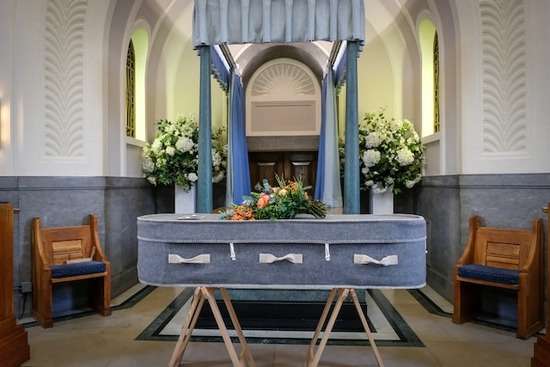
Photo by The Good Funeral Guide on Unsplash
Typically, when someone passes away, the immediate family gets to work preparing a funeral. Depending on circumstances, a funeral service could be held anywhere within a few days or a few weeks from the time of the death.
It’s common for Adventists to avoid holding funerals on Sabbath, mostly because it involves a tremendous amount of work, planning, travel, and accommodations. On Sabbath, Adventists make it a priority to rest from everyday activities and focus on spending time with God.
Celebration of life services
Many Adventist communities also hold “celebration of life” or memorial services, whether in addition to a formal funeral or in place of it. These could be held up to a few months after the person’s death.
Generally, these services take the place of funerals if the body was cremated or the funeral had to be delayed past the reasonable timeframe for burial.
Or in the case of larger Adventist communities, a family might hold a small graveside service for close friends and family, and a later memorial service to include others in fondly remembering their loved one.
Viewings
The day before or day of a funeral, Adventists might hold a viewing, or a window of time (usually a few hours) when friends and family can come to the funeral home or church and speak with the relatives of the deceased. It may be an open-casket occasion, or the family may display pictures.
In some countries, like Kenya, Adventists leave the casket containing the body of the deceased outside of the church.2 This is largely because people in these countries associate the act of bringing a body inside a church as a service for the deceased’s spirit—a service that conflicts with Adventist beliefs about death.
Nonetheless, some Adventists, particularly those in urban areas, opt to bring the casket inside for simple practical reasons because meeting at the church makes it easier for more guests and members to attend.3
Funerals
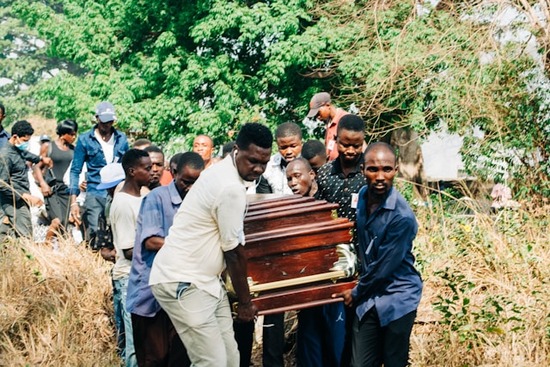
Photo by Bunting Kargbo on Unsplash
The funeral service typically takes place in a church or a funeral home. People attending might wear dark clothing and typically little or no jewelry, because of some of our beliefs about what we wear. The service often includes music, prayer, a reading of the obituary, Scripture readings, a few words from the pastor, and a benediction.
The pastor’s homily tends to focus on the hope we have in God and His plan, because all Adventists look for the day when Jesus returns at the Second Coming, and we’ll see our loved ones again in heaven. The whole service tends to have a hopeful feel, rather than one of abject sorrow, although the event is not without sadness.
The service doesn’t tend to be long—30 minutes or so, though it can depend on how many people share memories.
If the family chooses to have a graveside service, everyone will then travel to the gravesite, where the minister will often have a brief graveside service. Participants may sprinkle flowers over the casket, and it will be lowered into the ground.
In some cases, the family may provide a meal after the burial service for guests.
Even though this is a general blueprint for an Adventist funeral, there are countless variations you can expect to see. It depends on the family’s preferences and the individual’s requests, as long as it doesn’t conflict with the church’s official beliefs.
It also varies widely depending on the region of the world you live in. All cultures have their own traditions within Adventism, and it’s important to remember they may not look exactly like what we just described.
A funeral is an unhappy time, and Adventists seek to provide comfort for grieving loved ones. Let’s talk about that next.
How Adventists support the bereaved

Photo by Liza Summer
Funerals are a difficult time for the loved ones, who bear the sadness and often the financial burden as well.
Sometimes, the deceased’s family prefers to grieve privately, and their wishes should be respected. But as much as possible, Adventists try to help their friends during this time of sadness. They may send flowers or gifts to the family’s home, to let them know they’re thinking about them and praying for them.
Other times, church members may send food to the family. A funeral involves a lot of planning, and sometimes the last thing the bereaved want to think about is deciding what they’re going to eat, or what they’ll serve for those visiting from out of town. It can be an extra burden to have to organize and prepare those meals, so the local church family tries to help as much as they can.
Visiting the grieving members can also be appreciated, if they’re up to it. Sometimes the grieving family members need someone to talk to for various reasons: getting their mind off their sadness, having a friend to talk to about preparations, or having someone to comfort them and reassure them in a time that is overwhelmed with sorrow and uncertainty.
The most important thing you can do when an Adventist you know loses a family member is do your best to understand what their individual needs might be and try to help them in accordance with those needs. Find ways to sincerely let them know that you sympathize with them.
The death of a loved one is hard to cope with, even for Christians like Adventists who know we’ll see our Christian family members after the resurrection.
While we make sure not to dismiss this temporal sorrow we experience after a loss, we do recognize that it’s important to hold fast to that hope Jesus gives us, even in our darkest trials. He promises to never leave or forsake us (Hebrews 13:5).
And, even better, He promises that these horrible feelings people endure now will indeed end someday. When Jesus re-creates the earth,
“God will wipe away every tear from their eyes; there shall be no more death, nor sorrow, nor crying. There shall be no more pain, for the former things have passed away” (Revelation 21:4, NKJV).
Our sadness and pain won’t exist forever! We’ll see our loved ones someday, a day when death is banished forever. This is the hope Adventists cling to.
If you’d like to read more of what the Bible says about this time of mourning,
Related pages
- Reid, George W, “Cremation,” Adventist Biblical Research.org, General Conference of Seventh-day Adventists, https://www.adventistbiblicalresearch.org/materials/cremation/. [↵]
- Rabach, Odek. “Adventists and Burial Practices in Kenya,” Encyclopedia of Seventh-day Adventists, Jan. 29, 2020. [↵]
- Ibid. [↵]
More Answers
What Are Pathfinder and Adventurer Clubs?
What are Pathfinder / Adventurer Clubs?Like the boy or girl scouts, Pathfinders and Adventurers learn about nature and life skills. But what makes these clubs special is their purpose to bring young people closer to Jesus. If you’ve wondered about Pathfinder or...
What Is a Seventh-day Adventist Camp Meeting?
Although camp meetings didn’t begin with the Seventh-day Adventist Church, they’re very common to Adventists.
Do Seventh-day Adventists Believe Only They Will Go to Heaven?
No, Adventists definitely don’t believe they’re the only ones that will go to heaven. As a matter of fact, we don’t believe admittance into heaven is ever based on which church or denomination we belong to. People all over the world from different Christian denominations, religions, and walks of life will be welcomed by Jesus Christ.
Does the Adventist Church Have Youth Ministry Programs?
Does the Adventist Church Have Youth Ministry Programs?The Seventh-day Adventist Church has been organizing and operating youth ministry programs since 1879. In our opinion, youth ministry is one of the most important ministries a church can have. Being a tween or a...
How does one become a Seventh-day Adventist?
To be a Seventh-day Adventist Christian means to accept Jesus Christ as Lord and Savior. This means to recognize that Jesus alone can save you from sin and death (Savior) and to give Him full authority over your life (Lord and Master).
What Are Adventist Evangelistic Meetings?
The Seventh-day Adventist Church puts a huge emphasis on sharing the gospel through evangelism, or sharing the gospel through preaching, teaching, and testimony. One of the ways we accomplish this is by organizing public events called evangelistic meetings.
What Do Adventists Offer for Young Adults?
What Do Adventists Offer for Young Adults?In recent years, the age group often classified as “young adults” has been trickier to engage. It’s been a significant concern for Christian churches around the world. Though interestingly enough, similar observations...
Does the Seventh-day Adventist Church Believe in Paying Tithe?
Seventh-day Adventists believe in paying tithe and offerings based on the biblical command and our commitment to being wise stewards of God’s resources. These donations help fund the mission of the Adventist Church by supporting pastors, missionaries, church expenses, and evangelistic projects, among other things.
The Leadership Structure of the Seventh-day Adventist Church
The Leadership Structure of the Seventh-day Adventist ChurchThe Seventh-day Adventist Church has a representative form of structure that connects its 90,000-plus congregations across the globe and gives its members a part in decision-making. Though the Church was...
Seventh-day Adventist World Population and Demographics
Did you know that the Seventh-day Adventist Church has more churches around the world than all the Pizza Hut, McDonald’s, and Subway restaurants combined?
Do I Need to be an Adventist to be Saved?
The answer to this question is simply, “no.”
All about Adventist Elementary Schools
The Seventh-day Adventist Church operates the largest Protestant education system in the world. A big part of this system is our K-8 elementary schools, or primary schools, as they’re known in other parts of the world.
Everything You Need to Know About Sabbath School
Sabbath School is the Bible study component of the church program at most Seventh-day Adventist Churches. It’s a time of Bible study on a specific topic or lesson. Instead of listening to a preacher, people interact with one another, making it a great opportunity for building friendships.
What Is Vespers?
Friday rolls around, and you’re spending time with your friends or relatives when they mention they’re going to vespers this evening.
Do Seventh-day Adventists Believe in Medical Care?
Adventists talk a lot about health principles and disease prevention. But how do we handle sickness and medical needs when they inevitably come along?
Do You Have to Be Vegetarian to Be Adventist?
Of course not. Membership in the Seventh-day Adventist Church has never included any dietary requirements.
How Do Adventists Do Baby Dedications?
For Christians, dedication ceremonies for babies are a special and memorable time for parents and the church. They often happen during a congregation’s main worship service when parents present their child before God and the church community, similar to how families did in the Bible.
What to Expect When You Go to an Adventist Church
If you’re attending an Adventist church for the first time, you may wonder what it’s really like. While each Adventist church is unique in its collective personality and local culture, Adventist church services are generally similar to most other Protestant Christian church services.
Everything You Need to Know About Sabbath Meals
For Seventh-day Adventists, sharing a Sabbath meal with friends and family is one of the most special and memorable parts of the Sabbath.
Why do Adventists Emphasize Religious Liberty?
Adventists see religious liberty as an essential human right. After all, God endowed humanity with freedom of choice from the very beginning. So we believe it’s best for governments to also support their citizens’ rights to worship based on their convictions.
All About Seventh-day Adventist Colporteurs
The Seventh-day Adventist Church uses a variety of methods to spread the hope of the gospel to the world. One of these ways is through colporteuring, also called “canvassing” or “literature evangelism.”
The Benefits of A Seventh-day Adventist Academy
Adventist academies are high schools (grades 9-12) that are owned and operated by the Seventh-day Adventist Church.
Who Are Adventists
The Seventh-day Adventist Church—“Adventists” for short—is a Christian denomination of ordinary people who seek to follow Jesus and live out His mission in this world. Established in 1863, we hold to the Protestant principle of sola scriptura, which means the Bible guides everything we do.
Evangelism
Evangelism is simply sharing the truths of the Bible with someone else. And Adventists are all into it.
Adventist Pastors
What is the role of a pastor in the Adventist Church?
Do Adventists Celebrate Christmas?
In many parts of the world, Seventh-day Adventists celebrate Christmas as a way to remember the birth of Christ. In certain parts of Africa, though, Christmas is much more low-key for Adventists, having less to do with religion and more to do with family time.
What Is ASI (Adventist-Laymen’s Services and Industries)?
ASI, which stands for Adventist-laymen’s Services and Industries, is a membership-based organization that provides support for Seventh-day Adventist laypeople (Adventist professionals who aren’t pastors).
Sola Scriptura—What Does It Mean, and Why Is It So Important?
Sola scriptura is a term that originated during the Protestant Reformation. It represents the way many Christians view the Bible and its authority.
What is the Concept of “Present Truth” and Why is it Important?
Present truth is the principle that certain biblical truths are relevant to God’s people at specific times in history. God sends the Holy Spirit to reveal truths that help us better understand how to interpret and apply His Word in a present moment.
Didn’t find your answer? Ask us!
We understand your concern of having questions but not knowing who to ask—we’ve felt it ourselves. When you’re ready to learn more about Adventists, send us a question! We know a thing or two about Adventists.

